Your cart is currently empty!
Author: admin
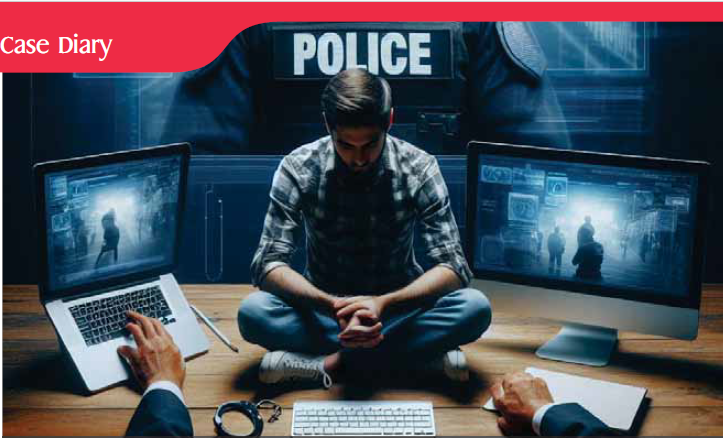
Digital Arrest Scam: Kolkata Resident Defrauded of Over Rs 3 Crores by Fraudsters
Digital fraud, now commonly referred to as ‘Digital Arrest,’ has taken on a new form, where scammers deceive citizens under the guise of government officials. A recent case highlights the severity of this issue involving a resident of South Kolkata who was defrauded of Rs 3.4 Crores.
In September, the victim received a call from an unknown number. The caller claimed to be an official from the Telecom Regulatory Authority of India (TRAI) and accused the victim of uploading inappropriate content on a website called phoneerotica.com. The caller issued threats of punitive measures, leading to panic and confusion. When the victim denied involvement, explaining his limited technical knowledge regarding mobile devices, the caller insisted that his phone number was connected to the alleged offending content. The caller warned that the number might be banned under TRAI regulations, stating that a case had been opened by the Mumbai Police.
Following this, the victim was connected to a landline call from someone identifying himself as Sub-Inspector Vikram Singh of the Mumbai Police, who provided his ID number (5017) and a case document reference.The alleged officer informed the victim about an ongoing registered case, making intimidating remarks that suggested the victim had committed a serious crime. Despite the victim’s claims of innocence, the caller asserted that the case had been forwarded to the Cyber Crime Department and connected him to another individual claiming to be part of that division.
This victim from Kolkata then received a WhatsApp video call from a number that displayed the emblem of the Mumbai Police Department. The caller identified himself as Anand Ranga from the the Cyber Crime Department, but refused to activate his camera. He falsely claimed that the victim was involved in a money laundering case under the Prevention of Money Laundering Act (PMLA). To further the deception, the caller accurately recited the victim’s Aadhar Card number and pressured him to send a photograph of the card for alleged verification related to a purported arrest warrant from the Supreme Court of India. The victim, feeling coerced, complied with this request.
The situation escalated when the caller sent a document resembling a warrant issued by the Supreme Court, which bore the victim’s Aadhar Card number. This alarming act caused significant distress for the individual. The caller then inquired about the victim’s family situation, and upon discovering that the victim’s wife was paralysed, he resorted to threats, stating that he would implicate and arrest the victim’s son unless he cooperated fully. He presented three choices to the victim: travel to Mumbai for surrender, face an immediate arrest by local authorities in Kolkata, or adhere to the caller’s instructions.
Under immense pressure and fear, the victim divulged sensitive information regarding his bank accounts, fixed deposits, and mutual funds when the caller requested his financial details. The caller continued to intimidate the victim by sending a document labelled ‘CBI Consent in Terms of Confidentiality Agreement,’ which bore the CBI seal. This document cautioned the victim against disclosing any details to anyone, including family members, under the threat of immediate arrest and asset confiscation. The caller further claimed that the victim was being monitored and implied that people were following him to ensure compliance, intensifying the victim’s fear and anxiety.
The caller further claimed that under a government scheme, black money could be returned through third-party accounts. He went on to say that the only way the victim can protect himself is by liquidating his FDs, mutual funds and other investments, and transferring the demanded accounts to the accounts provided by the caller, over time. Even though the victim insisted on his innocence, he was assured that he would recover his funds once cleared of the alleged charges. The caller pressured the victim into liquidating his fixed deposits, mutual funds, and other investments. He instructed the victim to transfer Rs 3,40,00,000 to various accounts provided by him.
As the situation escalated, the caller used multiple phone numbers to instil fear and to pressure the victim. Over time, the caller offered vague updates about an ongoing case against the victim, claiming that progress was being made and that the investigation would ultimately reveal his innocence, leading to his discharge from the Prevention of Money Laundering Act (PMLA) case. The victim, unfamiliar with legal procedures and overwhelmed by fear and trauma, placed trust in the misleading reassurances provided.
However, after mid-October, the caller’s behaviour changed dramatically. He began to ignore the victim’s calls and messages, particularly when he inquired about the progress of the case or the process for reclaiming his money post-discharge. The supposed police officer’s responses grew increasingly vague, and he ultimately blocked the victim from most contact numbers, ceasing all forms of communication. It became apparent to the victim that he had been deceived and extorted by a fraudster during this ordeal. He realised the promises made were false and the transactions were part of a well-orchestrated scam.
This case serves as a cautionary tale about the growing prevalence of digital scams and the deceptive tactics employed by fraudsters to exploit unsuspecting individuals. It highlights the importance of being vigilant against such schemes and verifying the legitimacy of any such calls or claims made by alleged officials.
It is extremely important to be cautious of fraudulent calls where scammers impersonate officials and pressure innocent and gullible people into transferring large sums of money for fake schemes. These scams often exploit fear and urgency, tricking victims into financial loss with false promises of resolving legal or financial matters.
Inputs:
Cyber Crime Station, Lalbazar HQ, KolkataPolice.

Digital Arrest: Navigating Cybercrime in the Modern Era
Shukla Sinha Roy is the Inspector at the Cyber Crime Station, Lalbazar HQ, Kolkata Police
The Evolution
As the internet began to flourish in the late 20th century, so did opportunities for criminal behaviour online, including fraud, identity theft, and hacking. This era marked the early stages of cybercrime, where criminals began exploiting the blossoming digital landscape.
By the early 2000s, the rapid rise of social media, online banking, and e-commerce created new challenges and opportunities for criminals and law enforcement. These advancements allowed fraudsters to gather personal information more easily and to devise sophisticated methods to exploit unsuspecting individuals.
What is a Digital Arrest Scam?
Digital arrest scams emerged as a subset of these cybercrimes, becoming more common with the rapid advancement of technology and the growing dependence on digital communication for personal and professional interactions. These scams exploit individuals’ fears of law enforcement and their
trust in official channels. Typically, scammers impersonate police officers, government agencies, or legal authorities, contacting victims via phone calls, emails, or text messages. They claim the victim is under investigation, has unpaid fines, or has committed a crime, threatening immediate arrest unless payment is made.

Factors Fueling the Rise of Scams
Widespread availability of personal information online: The increase in data breaches and oversharing on social media has provided scammers easy access to personal details.
Advancements in spoofing technology: Fraudulent calls and messages appear legitimate, making it harder for victims to discern scams.
Lack of public awareness: Many people remain unaware of how these scams operate, making them more susceptible.
Moreover, the anonymity of digital platforms enables scammers to operate across borders, complicating efforts to trace and prosecute them. As technology evolves, these scams have become increasingly sophisticated, underscoring the urgent need for heightened public awareness and preventive measures.
How does it Work?
False Accusations: Scammers claim that the victim is implicated in criminal activities, such as drug trafficking or possessing illegal items.
Fabricated Emergencies: Victims may be told that a loved one is in trouble, such as being in custody or involved in an accident.
Demand for Money: To resolve these fabricated issues, victims are asked to transfer money immediately.
Recommendations for Victims
Do Not Engage: Do not respond to messages or calls claiming that you are involved in drug trafficking, pornography, rape, or money laundering.
Do Not Transfer Funds: Never transfer money. Government agencies do not request money to conduct investigations.
Protect Personal Information: Do not disclose personal information online or to callers claiming to be from a public utility company or bank.
Exercise Caution: Be skeptical. Government agencies do not make accusations or perform arrests through video calls.
Appropriate Actions to Take
Verify Caller Identity: Always confirm the identity of individuals claiming to be from official agencies.
Avoid Immediate Payment: Do not transfer money based on unsolicited calls or video requests.
Seek Assistance: Contact local authorities or trusted individuals if you receive suspicious communications.

Fighting Cybercrime and Serving Society with Purpose
Abhishek Modi, an IPS officer from the 2011 batch of the West Bengal cadre, currently serves as the Deputy Commissioner of Police (DCP) for the Cyber Crime Department of Kolkata Police. Known for his technical expertise and no-nonsense approach, Modi is deeply committed to safeguarding citizens from cyber fraud. His proactive efforts to raise public awareness reflect his belief that “knowledge is the best defence against cyber threats.”
Modi’s journey into law enforcement began after completing his B.Tech in Electrical Engineering from IIT Bombay. Despite starting his career at a networking firm, he felt a stronger calling to serve society, prompting him to pursue the Civil Services examination while managing a full-time job. His discipline and perseverance during this period laid the foundation for his successful career in public service.
The Journey in Bureaucracy
Abhishek Modi challenges the concept that humanities graduates have an edge in civil services. He believes the examination process is balanced, offering equal opportunities to all academic disciplines. As an engineering graduate, his technical background proved advantageous, particularly when choosing Mathematics as one of his core papers—a decision that played a key role in his success.

Modi’s law enforcement career began in 2013 as the Assistant Commissioner of Police (ACP) in the Bidhannagar Police Commissionerate. He went on to serve in Malda, Cooch Behar, Asansol Durgapur Commissionerate, and later as Superintendent of Police (SP) in Jalpaiguri. Returning to the plains, he was posted in Barrackpore before assuming the role of Deputy Commissioner of Police (DCP) in the Asansol Durgapur Commissionerate once again. Each posting exposes him to diverse challenges, from managing rural and semi-urban law enforcement to tackling border security issues. His role as DCP in the Cyber Crime Department marks a critical phase in his career, where he combines technical expertise with public service to tackle digital threats.
Every assignment has deepened his commitment to upholding justice, ensuring public safety, and protecting the rights of citizens, reinforcing his dedication to serving the community with integrity and purpose. His leadership in cyber policing reflects his mission to ensure a safer digital environment for all.
Personal Management – Handling Stress
Police professionals often face immense pressure, requiring resilience and effective stress management. Abhishek Modi relies on several activities to maintain balance. Reading, particularly motivational and technical books, provides mental rejuvenation and inspiration. His interest in badminton helps him stay fit while unwinding after long hours of work, and cooking offers a creative escape that helps him relax.
Despite a demanding work schedule, these hobbies enable Modi to recharge and maintain focus, teaching him that a healthy mind and body are essential, especially in high-stress fields like law enforcement.
Cybercrime
Cybercrime has become one of the most dynamic and complex forms of crime, requiring specialised expertise. With his engineering background, Abhishek Modi is well-equipped to understand the technical intricacies of cybercrime. One major challenge is the gap in technical knowledge among many police officers, which can hinder cyber investigations. To address this, law enforcement agencies are actively working to enhance their technical skills through specialised training programmes. Abhishek is committed to continually upgrading his own skills to stay ahead of the evolving cyber threat landscape.
Raising Awareness Among Vulnerable Groups
Cybercriminals often target vulnerable groups such as senior citizens or those unfamiliar with technology. Common forms of cybercrime affecting these individuals include:
Spam Calls and Phishing: Fraudsters posing as bank officials or service providers to steal sensitive information.
Malicious Software: Harmful links sent through emails or messages that install malware on devices.
Fake Calls and Social Engineering: Criminals exploiting trust to extort money or sensitive information.
Abhishek emphasises the importance of educating the public, especially the elderly, on these threats. He believes that increasing awareness can significantly reduce the risks associated with digital vulnerabilities.
The Threat of Sextortion
Sextortion has become a significant threat in the world of cybercrime, where criminals use AI and software to create fake or altered images and videos of victims. These are used to blackmail individuals for money or other demands. Victims often feel ashamed and are reluctant to report the crime, allowing perpetrators to continue their exploitation.
Abhishek Urges Victims to:
Report Immediately: Quick reporting increases the chances of apprehending criminals.
Avoid Paying: Paying only encourages further exploitation.
Seek Support: Share the incident with trusted friends or family to receive emotional support.
With AI making it easier to create convincing fake content, Abhishek stresses the importance of awareness and prompt reporting in combating sextortion.
Report Calls Claiming Digital Arrest
The rise of ‘Digital Arrest’ scams is another troubling development in cybercrime. These scams, often originating from countries like China and the UAE, prey on people’s confusion about legal processes. Fraudsters claim to be law enforcement officials and demand money to avoid a supposed digital arrest.
Abhishek reminds the public that digital arrest has no legal basis. Arrests require formal procedures, including documentation and in-person interaction.
Key Points to Remember:
Digital Arrest is Fake: If you receive such calls, it is a scam.
Police Procedures are Transparent: Arrests must adhere to legal protocols.
No Money Demands: Legitimate law enforcement will never ask for money over the phone.
What to Do:
Report the Incident: Immediately contact the nearest police station or cybercrime unit.
Do Not Engage: Never share personal or financial information with the caller.
File an Official Complaint: Provide details such as the caller’s number and any demands made.
Fraudsters evolve their tactics continuously, often impersonating law enforcement to create a sense of urgency and fear. Awareness and prompt reporting are essential to protect individuals and communities from such scams.
The Uniform
Wearing the uniform has been a transformative experience for Abhishek Modi. It has instilled a sense of discipline, empathy, and responsibility in him. The uniform represents not just authority but a deep sense of duty to serve the community. It has kept him humble, emphasising service over self, and has allowed him to help the marginalised and vulnerable, ensuring justice, security, and hope.
For Abhishek, the uniform is not just a symbol of his profession; it is a way of life that demands integrity, commitment, and compassion. It serves as a constant reminder that their actions and decisions have the power to shape lives, protect communities, and uphold justice. The uniform represents the privilege and responsibility of serving with honour, guiding officers like Abhishek in their mission to make a positive difference in society.

‘Safe Drive, Save Life’ Campaign: Building a Culture of Road Safety
Road safety is paramount in safeguarding lives, minimising injuries, and preventing road fatalities. It is essential to ensure that traffic systems function orderly and efficiently to facilitate smoother travel for all road users, including pedestrians, cyclists, and motorists. The Kolkata Police realises that by prioritising road safety, they can foster a culture of responsible driving and create safer environments within communities. Let us learn more about their campaign for road safety through this conversation between The Kolkata PROTECTOR and Rupesh Kumar, IPS, Joint Commissioner of Police – Traffic.
Could you share with us about the impactful ‘Safe Drive, Save Life’ campaign?
Safe Drive, Save Life – a campaign initiated to make roads faster, safer, and friendlier- is earning mass popularity. Initiated by our Hon’ble Chief Minister Mamata Banerjee on July 8, 2016, its goal is to significantly reduce road traffic accidents, make citizens realise the need to adhere to safe driving rules, ensure safer commuting, and foster a culture of responsible driving across the city.
What are key measures implemented to achieve its objectives?
To achieve the objectives, the campaign employs a multi-faceted approach centred around enforcement, awareness, and infrastructure development, executed in close collaboration with various stakeholders.
We have implemented robust enforcement measures to ensure road safety. Advanced traffic monitoring systems, such as CCTV cameras, speed guns, and automatic number plate recognition (ANPR), help us keep a close eye on violations. We strictly enforce penalties for offences like drunk driving, speeding, rash driving, and failing to use helmets or seatbelts. Additionally, we have introduced designated pedestrian crossings, no-horn zones, and safe zones for cyclists to make our roads safer for everyone.
Our awareness campaigns take diverse approaches to educate and engage the public. We conduct workshops in schools, colleges, and offices to highlight the importance of traffic rules and safe driving. Creative outreach efforts, including street plays, billboard campaigns, and social media drives, have proven effective in spreading the message. Collaborating with public figures and influencers helps us reach a broader audience and foster a culture of responsible driving.
Infrastructure development is key to safer and more efficient urban transportation. We partner with agencies like the Public Works Department (PWD), Kolkata Municipal Corporation (KMC), and Kolkata Metropolitan Development Authority (KMDA) to improve road conditions through better signage, enhanced lighting, and solutions for accident-prone zones like smart signals, underpasses, and flyovers. Upgrades to road markings and lane dividers improve clarity and traffic flow. Expert consultations help tailor strategies to Kolkata’s unique needs, incorporating global best practices to reduce congestion and ensure sustainable mobility.
How has the campaign contributed to improving road safety in the city?
Since the inception of the ‘Safe Drive, Save Life’ campaign, we have seen a notable reduction in road traffic accidents and fatalities. Citizens have become more aware of road safety norms, and there has been a measurable improvement in compliance with traffic regulations. Kolkata’s roads are steadily becoming safer, reflecting the success of this ongoing initiative.
How does the Kolkata Police’s crash analysis process improve road safety?
First and foremost, I would like to emphasise the critical importance of coordination in our approach to road safety. When an accident occurs, we work with a reputed private institute to conduct a detailed crash analysis. This helps us find the root causes, gain insights, and take preventive action.
Our officers study factors like driver behaviour, vehicle condition, road design, and environmental issues to determine what caused the accident. High-risk areas, or black spots, are given priority for action. We then work with agencies like the PWD, KMC, and KMDA to address these issues by improving lighting, adding signs, fixing roads, and revising traffic patterns.
After making these changes, we monitor their impact and gather feedback to evaluate their effectiveness. This helps us improve our strategies and ensure ongoing road safety improvements for everyone.
How do District Road Safety Committee meetings drive collaboration and lead to improvements like crash barriers, median installations, and better illumination?
As per the mandate of the Supreme Court Committee on Road Safety, we conduct monthly meetings of the District Road Safety Committee. These meetings serve as a vital platform where all stakeholders in road safety come together to assess progress, identify challenges, and propose actionable solutions. In 2024, around six such meetings were successfully conducted, demonstrating our commitment to upholding this mandate.
We review and discuss insights from crash analyses conducted with private institutes and our field officers. This includes root cause identification and recommendations for improvement.
Reports from OCs (Officer-in-Charge) and Sergeants performing field duties provide on-ground perspectives about traffic patterns, accident-prone areas, and enforcement challenges.
Feedback from citizens, collected via emails, social media handles, and direct interactions, is essential to our discussions. We carefully document suggestions and identify any shortcomings or gaps, ensuring their voices play a pivotal role in shaping road safety measures.
Regular coordination with agencies like the PWD, KMC, and KMDA, and entities such as the Metro Railway and KMRC, is crucial for addressing engineering, infrastructure, and illumination issues.
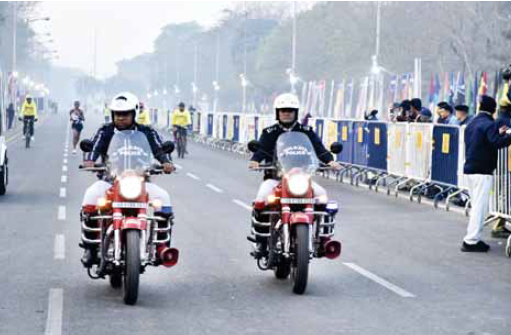
What are the achievements and improvements seen through these coordinations?
Through regular coordination, there has beena noticeable decline in road accidents and fatalities.
Basanti Highway: After identifying it as a high-risk area, we collaborated with the PWD, resulting in the installation of crash barriers. These barriers significantly reduced fatalities, marking a major milestone in our efforts. Additional steps included lane demarcations, speed limit signs, and enhanced enforcement measures to ensure safe driving conditions.
Diamond Harbour Road: We implemented similar measures on this key road as we did on the Basanti Highway, resulting in significant infrastructure improvements and enhanced safety for commuters.
Median Barriers: In collaboration with the Metro Railway and KMRC, we installed median barriers to prevent pedestrians from crossing at undesignated places. This measure has improved pedestrian safety and reduced accidents caused by jaywalking.
Illumination Improvements: We worked with KMC and PWD to enhance illumination, ensuring better visibility and safer travel during the night, especially in areas with insufficient lighting.
Iron Crash Barriers: We installed iron crash barriers in critical areas to minimise the impact of accidents, thereby reducing the severity of injuries and fatalities.
By focusing on infrastructure improvements, enforcement, and community involvement, we continue to make Kolkata’s roads safer and more reliable for all.
How do Kolkata Police’s daily, monthly, and annual awareness campaigns foster a culture of road safety and encourage responsible driving among citizens?
Creating awareness is the cornerstone of our road safety initiatives. Through daily efforts, monthly campaigns, and annual programmes, we aim to instil a sense of responsibility and awareness among all road users.
Our day-to-day campaigns focus on addressing immediate road safety concerns through direct interaction with the public.
Our monthly campaigns delve deeper into specific issues, such as seatbelt compliance, helmet usage, and pedestrian safety, ensuring a sustained and focused effort throughout the year.
We organise our flagship event, the ‘Annual Road Safety Week’,to amplify awareness across the city. This week features rallies and marches led by students, citizens, and police personnel; workshops and seminars on road safety measures and best practices, and interactive sessions with drivers, commuters, and other stakeholders.
Special awareness activities are organised for defaulter drivers to educate them about the consequences of their actions and encourage them to adopt safe driving practices. These sessions include discussions on the legal and ethical responsibilities of drivers, and real-life case studies highlighting the devastating impact of reckless driving.
To cultivate a culture of safety from a young age, our team conducts school visits where students are educated about traffic safety rules and the importance of following them, proper ways to cross roads, such as using zebra crossings and pedestrian signals, and recognising road signs and signals, and understanding their significance.
We also conduct targeted campaigns to address pressing concerns, such as:
Drink and Drive: We emphasise the dangers of driving under the influence and promote alternatives like designated drivers or app-based ride services.
Women’s Safety: We raise awareness about safety measures for women commuters, ensuring they feel secure on roads and in public transport systems.
Safe Speeding and Lane Discipline: We educate drivers about the importance of speed limits and maintaining lane discipline to prevent accidents.
These awareness campaigns have helped increase public compliance with traffic regulations. They have enhanced the safety of vulnerable groups, such as children and women, and encouraged community participation in road safety efforts, creating a collective responsibility towards safer roads.
How has the integration of the Bhangar area into the Kolkata Police jurisdiction improved traffic management, infrastructure development, and successful awareness campaigns in rural areas?
When Bhangar was brought under the jurisdiction of the Kolkata Police, it marked a significant milestone in extending our traffic management and enforcement capabilities. To address the specific needs of this newly integrated area, we enhanced our traffic management capabilities by establishing a dedicated Traffic Guard to address the area’s unique needs. We installed traffic signages, road markings, and infrastructure improvements to streamline traffic and boost road safety, focusing on rural and semi-urban challenges.
To tackle these challenges, we launched awareness campaigns to educate locals about traffic rules. Many residents, especially those in rural areas, were not accustomed to wearing helmets or adhering to traffic rules. We were concerned about how the community would respond to these changes, given the shift from traditional practices. Despite initial hiccups, the community responded positively, embracing change for road safety.
We conduct targeted campaigns in schools and colleges where officers, including the OC (Officer-in-Charge), AC (Assistant Commissioner), and DC South (Deputy Commissioner of Police, South Division), personally visit schools and colleges in the area. These officers conduct interactive sessions to teach students about helmet use, traffic signals, and the importance of safe driving. Public meetings and community discussions further engaged the local population, building strong partnerships between Kolkata Police and the community.
How does the Kolkata Traffic Police plan to enhance road safety and establish Bhangar as a model for rural traffic management?
With the continued support and cooperation of the people, we aim to strengthen the road safety infrastructure in Bhangar and expand awareness campaigns to reach every segment of the population. We want to build on the positive momentum to ensure that Bhangar is a shining example of rural traffic management under the jurisdiction of the Kolkata Traffic Police.
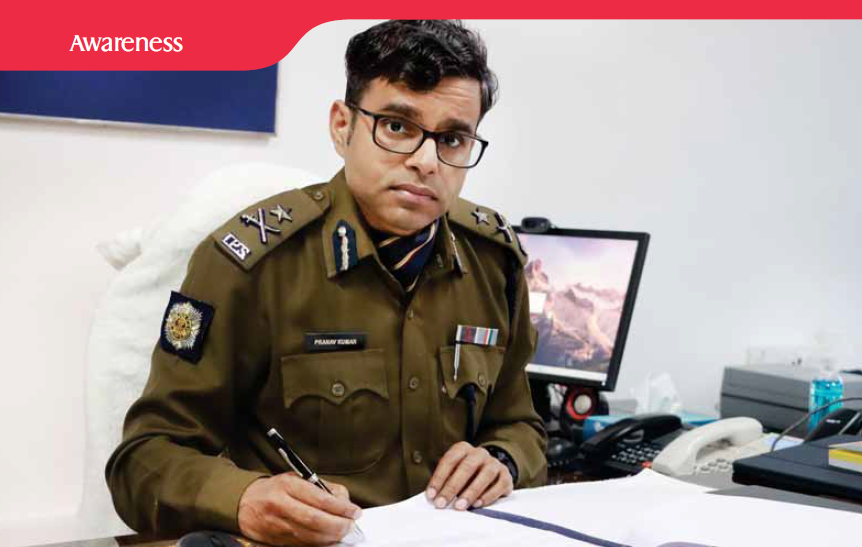
Preventing Cyber Fraud: A Collective Responsibility
Dr. Pranav Kumar, IPS, Additional CP (II), Kolkata Police
The internet has made life significantly easier by allowing us to shop, bank, communicate, and conduct business online. However, this convenience has also increased the risk of cyber fraud, where criminals employ various methods to deceive people and steal money or sensitive information. Cybercriminals exploit technology and human error to carry out these activities. Awareness and prevention are essential to staying safe online. While law enforcement agencies, such as Kolkata Police, are actively working to combat cyber fraud, public participation and awareness are crucial in minimizing risks.
Understanding Cyber Fraud
Cyber fraud encompasses any criminal activity that is executed using a computer, smartphone, or the internet. Anyone can be a victim—students, professionals, senior citizens, and business owners alike. Understanding the different types of cyber fraud is the first step in preventing them. Some of the most common types include:
Phishing Attacks: Fraudsters send fake emails, messages, or calls pretending to be from banks, government agencies, or trusted companies in order to steal personal details such as passwords, ATM PINs, and OTPs.
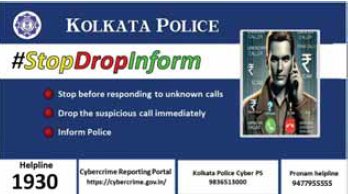
Online Financial Frauds: Fake e-commerce websites, UPI scams, and fraudulent investment schemes trick individuals into making payments without delivering goods or returns. Many people worldwide have lost money to investment fraud by investing in fake stocks suggested by scammers. Recently, there has been a rise in online hotel booking fraud, where unsuspecting customers are deceived by fraudsters through sham websites that offer extremely low hotel rates at various tourist destinations.
Identity Theft: Criminals misuse stolen personal data to commit financial fraud, apply for loans in someone else’s name, or create fake social media profiles to mislead others.
Ransomware Attacks: Hackers install malicious software that locks important files and demand payment to unlock them. Increasingly, criminals are asking for ransom payments in cryptocurrency.
Social Media Frauds: Fraudsters create fake profiles to offer phony job opportunities or use emotional manipulation in online relationships to trick victims into transferring money. Numerous instances of WhatsApp account hacking have been reported, where cybercriminals gained control of accounts after victims unknowingly shared their OTPs (One-Time Passwords).
SIM Swap Fraud: Scammers obtain a duplicate SIM card of a victim, allowing them to access mobile banking and steal funds from the victim’s accounts.
Online Loan Scams: Fraudulent loan providers offer quick loans and request processing fees or personal information, which is later misused.
QR Code Scams: Scammers trick individuals into scanning QR codes that lead to unauthorised withdrawals or deductions from their bank accounts.
Digital Arrest: This emerging cybercrime involves scammers extorting money or sensitive information by threatening victims with legal action. In cases investigated by the Kolkata Police, scammers have misused identity documents or falsely accused victims of having narcotics sent in their name. Many people have lost significant amounts of money in these schemes. The Kolkata Police have successfully made several arrests related to this type of fraud.
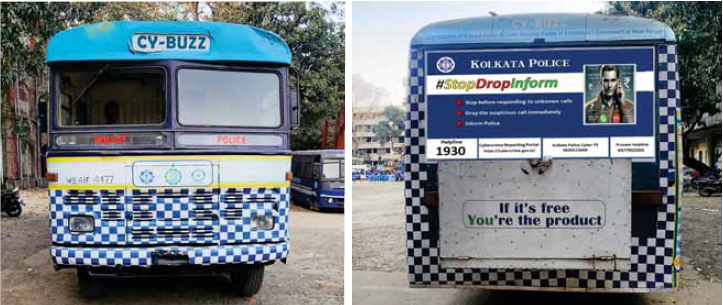
Legal Provisions Against Cyber Crimes
Cyber fraud is punishable under various sections of the Information Technology Act, 2000, and the Bharatiya Nyaya Sanhita, 2023, which has replaced the Indian Penal Code.

Best Practices to Prevent Cyber Fraud
To enhance your cybersecurity and protect against fraud, follow these essential practices:
Never Share OTPs or Bank Details: Remember that banks and government agencies will never ask for your OTPs, PINs, or passwords. Always verify any requests before sharing any personal information.
Use Strong Passwords: Create passwords that combine letters, numbers, and symbols. Change your passwords regularly and avoid reusing the same password across multiple accounts.
Enable Two-Factor Authentication (2FA): Turn on 2FA for your banking, email, and social media accounts to add an extra layer of security.
Verify Unknown Links: Avoid clicking on suspicious links in emails, SMS, or WhatsApp messages, as these may lead to phishing websites.
Use Secure Websites: Before entering payment information, ensure the website URL begins with ‘https://’ and is from a trusted source.
Avoid Public Wi-Fi for Transactions: Public networks can be vulnerable to hacking. Use a VPN or mobile data when conducting financial transactions.
Check Financial Statements Regularly: Monitor your bank account and credit card statements frequently to catch any unauthorised transactions promptly.
Do Not Download Unknown Apps: Fraudsters may create fake apps to collect your data. Always download applications from official sources, such as Google Play or the Apple App Store.
Be Cautious with QR Codes: Always verify the source of a QR code before scanning it. Avoid scanning if someone requests payment through QR codes without providing an explanation.
Educate Family Members: Cybercriminals often target senior citizens and teenagers. Ensure that you educate them about online safety to help protect against potential scams.
Steps to Take If You Are a Victim of Cyber Fraud
If you suspect that you have been scammed, take immediate action to minimise damage.
Fraudsters often act quickly, withdrawing funds, transferring them across international borders, or converting them into cryptocurrency to evade detection. The sooner cyber fraud is reported, the higher the chances of recovering the lost funds. Here are the essential steps victims of cyber fraud can take:
Report the Fraud: Call the national cybercrime helpline at 1930 or visit www.cybercrime.gov.in to file a complaint. You can also contact the Kolkata Police Cyber Police Station at +91-9836513000.
Inform Your Bank: If your bank account is affected, notify your bank immediately to freeze transactions and prevent further losses.
Change Passwords: If your online accounts have been compromised, reset your passwords right away.
Keep Evidence: Save messages, transaction details, emails, and screenshots as proof for the investigation.
Inform the Cyber Crime Cell or Nearest Police Station: Registering a complaint and allowing an investigation can assist in recovering funds and apprehending the culprit.

Kolkata Police’s Role in Fighting Cyber Crimes
Kolkata Police actively works to prevent and investigate cyber fraud through various initiatives:
Cyber Awareness Programmes: Organising workshops, campaigns, and social media drives to educate citizens about online fraud. Under the CyBuzz programme, a bus tours the city providing educational materials on cyber safety.
Specialised Cyber Crime Units: A dedicated cybercrime police team investigates fraud cases and tracks down criminals. Cyber fraud cases are also handled by respective police stations.
Collaboration with Banks and Digital Platforms: Working with financial institutions to track and freeze fraudulent transactions.
Training Police Officers: Enhancing officers’ skills to tackle evolving cyber threats through specialised training programmes.
Stop, Drop, and Inform Campaign
The Kolkata Police has launched the Stop, Drop, and Inform campaign to help citizens protect themselves from telecaller scams and other cyber frauds. The Kolkata Police has initiated the “Stop, Drop, and Inform” campaign to assist citizens in safeguarding themselves against telecaller scams and other forms of cyber fraud.
The campaign focuses on three key areas: (i) Improving police response, detection, and recovery in cases of cyber fraud, (ii) Raising awareness among the public, and (iii) Providing special protection for the elderly.
The campaign suggests the following key
steps for citizens:
STOP: Before responding to unknown calls or sharing personal information, such as bank details, ATM PINs, OTPs, or passwords, think twice.
DROP: If you receive suspicious calls or see emails/messages requesting personal details or money, ignore and delete them.
INFORM: If you suspect fraud or believe you have been a victim, contact the police or the cyber crime helpline immediately.
This straightforward approach can help prevent many instances of cyber fraud and minimise financial losses for individuals. Campaigns targeting the elderly have been initiated through the flagship project, Pronam, along with regular programmes organised throughout the city. Additionally, regular cyber awareness materials are being disseminated via the Kolkata Police Twitter handle @KolkataPolice and Facebook page www.facebook.com/kolkatapoliceforce. Kolkata Police will soon be launching programmes on FM radio and podcasts to further the cause of cyber awareness.
Conclusion
Cyber fraud is a growing concern that requires awareness and active participation from everyone. By following basic online safety measures, staying alert to suspicious activities, and promptly reporting cyber fraud, individuals and businesses can protect themselves from financial losses. Kolkata Police remains committed to tackling cybercrime, but public cooperation is essential. Remember the “Stop, Drop, and Inform” approach to safeguard yourself and your loved ones.
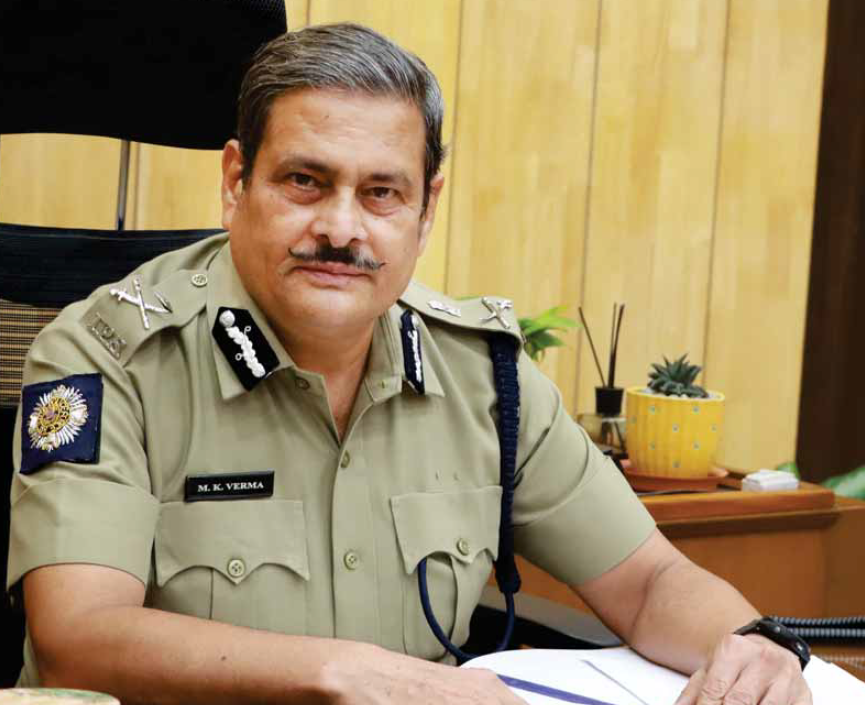
Building Trust through Competence and Integrity
Manoj Kumar Verma, IPS was appointed Commissioner of Police, Kolkata Police, in September 2024. He is a seasoned Indian Police Service (IPS) officer from the 1998 batch. He previously served as the Additional Director General (ADGP) and Inspector-General of Police (Law and Order) for West Bengal. Born in Sawai Madhopur, Rajasthan, and raised across the country due to his father’s military service, Verma graduated in mechanical engineering before joining the IPS. His career includes key roles such as Superintendent of Police in West Midnapore, Inspector General of Police in Darjeeling, and Inspector General of the Anti-Corruption Branch. Known for his expertise in handling sensitive areas like Naxalite-affected Jangalmahal, he has built a reputation as a trusted and effective leader. In a conversation with
Anurag Sinha, Editor, The Kolkata PROTECTOR, Manoj Kumar Verma, IPS, discusses his perspective on law enforcement, highlighting his approach to strategic thinking, adaptability, and commitment to integrity, while focusing on the challenges and responsibilities of ensuring public safety and supporting his team.
As a decorated self-made police officer who has won many laurels, how do you see the change in policing in India?
Policing in India has undergone significant transformations, driven primarily by the evolving nature of crime. The increasing use of technology by criminals has compelled police forces to rethink and modernise their strategies, integrating advanced technological tools for effective policing.
At the same time, traditional methods such as intelligence gathering, maintaining a visible presence in communities, and fostering strong public relationships remain the foundation of effective policing. The blending of these time-tested practices with modern tools has allowed us to address a broader spectrum of challenges, including urban safety, Naxalism, and terrorism. The scope of policing has expanded, moving beyond conventional crimes to tackle emerging threats like online fraud, digital extremism, and privacy breaches. This evolution not only reflects the changing face of crime but also highlights the adaptability and resilience of the Indian police force.
What measures do you believe are critical to boosting the morale of the police force, while encouraging different police thanes and personnel?
Boosting morale within the police force is critical for fostering teamwork and ensuring operational efficiency. A high-performing force is built on trust, motivation, and a sense of belonging. Key initiatives include increased interaction between senior officers and junior personnel to bridge hierarchical gaps and enhance communication. Regular participation in group activities and events fosters camaraderie, while frequent field visits by senior officers signal their commitment to understanding and addressing grassroots challenges. Addressing grievances promptly and maintaining open communication channels further strengthen morale. Additionally, monitoring and improving the fitness levels of personnel ensure their physical and mental readiness to face challenges.
Ultimately, fostering a culture of teamwork, empathy, and mutual respect is key. When personnel feel a sense of belonging, purpose, and recognition, they are more likely to perform their duties with dedication and integrity.
What additional measures is Kolkata Police implementing to ensure the safety of women, alongside existing initiatives?
Women’s safety and security are paramount to Kolkata Police, and we are committed to continually evolving and strengthening our strategies to address this critical concern. We focus on a holistic approach and combine technology, community involvement, and operational efficiency to create safer spaces for women.
Recognising the need for proactive and comprehensive approaches, we have introduced several measures in addition to the existing protocols. These include:
1. Enhanced Training and Sensitisation: All personnel, from senior officers to the junior-most ranks, undergo repeated briefing and sensitisation sessions. This ensures a deep understanding of women’s safety concerns and cultivates an empathetic approach to handling such cases.
2. Targeted Surveillance: We have significantly increased CCTV coverage, particularly in areas identified as vulnerable through detailed crime data analysis. This provides real-time monitoring and acts as a deterrent to potential offenders.
3. Increased Police Presence: Deploying more officers in high-risk areas, especially during late hours, ensures that vulnerable zones are actively monitored and accessible help is available.
4. Infrastructure Improvements: Enhancing the illumination of sensitive areas and addressing blind spots in public spaces contribute to creating a safer environment.
5. Community and Public Sensitisation: Engaging with the public, especially students, through awareness campaigns and workshops promotes a culture of vigilance and mutual responsibility.
6. Efficient Crime Handling: Ensuring thorough investigation of crimes against women, timely submission of charge sheets, and active monitoring of trials underscores our commitment to justice.
The festive season witnessed seamless road traffic management by the Traffic Department of Kolkata Police. How was such a complex task executed with precision?

The festive season demands extensive preparation, often beginning months in advance. The first crucial step is conducting thorough debriefing sessions, and analysing past festivals to identify challenges and lessons learned. This reflection allows us to refine our strategies and address any issues that arose in previous years. Additionally, it is vital to gather feedback from organisers, stakeholders, and the community to understand their plans and expectations for the upcoming events.
We meticulously craft police arrangements after collaborative meetings with all relevant parties. These discussions ensure that everyone is aligned and prepared for the event. Officers and personnel are briefed in detail, with clear assignments and an emphasis on coordination. We also ensure that all necessary equipment and traffic management infrastructure such as barriers, signage, and control devices are ready. In planning, we prioritise key considerations such as public safety, traffic flow, and emergency preparedness to ensure a smooth and secure festive experience.
Key aspects of our planning include:
• Ensuring public safety at all times.
• Smooth traffic management to minimise disruptions and delays.
• Monitoring weather forecasts to prepare for adverse conditions.
• Addressing sudden, unplanned events with flexibility and prompt action.
We conduct coordination meetings with all relevant stakeholders to ensure a seamless and comprehensive approach. These discussions help align goals, address potential challenges, and refine strategies for optimal execution. Once all arrangements are finalised, police operations are implemented precisely and clearly. Throughout the process, feedback from experienced field officers is continuously monitored, and any issues raised by the public are promptly addressed. If necessary, swift adjustments are made to the arrangements to ensure the safety and convenience of the public, demonstrating flexibility and responsiveness in dynamic situations.
It is often said that police personnel work under tremendous stress and strain. How do you address the mental health aspect of the Force? What advice would you give to the young men and women of the Kolkata Police?
Policing is an inherently demanding profession, and addressing the mental well-being of our personnel is as important as ensuring their physical fitness. A well-rounded approach to reducing stress includes regular activities that foster resilience and balance. These include:
• Physical Fitness Programmes: Regular jogging, running, and exercise regimens are essential to maintaining stamina and relieving stress.
• Yoga and Meditation: These practices help cultivate mental calmness and focus amidst daily challenges.
• Team Activities: Encouraging participation in games, cultural programmes, and other group engagements builds camaraderie and provides healthy outlets for stress relief.
• Work-Life Balance: Granting regular leaves, promoting family time, and providing a supportive work environment ensure our officers stay connected to their personal lives, which is vital for mental health.
I would like to encourage the young men and women of the Kolkata Police to stay disciplined and committed to your role as protectors of society. Take care of your well-being, seek help when needed,
and remember that strength comes from balance—mental, physical, and emotional.
Cyber fraud, particularly the so-called ‘digital arrest’ scam, is becoming a public nuisance across India. How is Kolkata Police tackling this growing threat?
Kolkata Police is fully equipped to combat emerging challenges like digital arrests, with a robust infrastructure to address such threats effectively. We employ advanced systems to monitor, analyse, and respond to cyber-related crimes, ensuring no stone is left unturned in our efforts to curb these offences. The foundational steps include the swift registration of FIRs, identification and arrest of individuals involved in such fraudulent activities, and ensuring a timely trial process to bring offenders to justice.
We actively encourage the public to report such crimes as early as possible, as prompt reporting is crucial in minimising the damage caused. To further bolster awareness, Kolkata Police conducts extensive outreach campaigns across various platforms, including social media, schools, colleges, workplaces, and large residential complexes. Additionally, we leverage mobile cyber labs to reach broader communities and educate the public on recognising and preventing digital fraud, creating a more informed and vigilant society.
As a very successful officer who has tackled Maoist threats to crisis scenarios in South Bengal, what would you attribute your success to?
Success in policing is never the result of individual effort alone—it is always the product of effective teamwork. I have learned that every challenge provides an opportunity for growth, and I make it a point to learn from every mistake. Quick adaptation to new technologies has been key in staying ahead of emerging threats while taking a deep, analytical approach to the issues at hand ensures that we address the root causes, not just the symptoms.
Gaining the public’s trust and support is equally important; their cooperation enables us to do our work effectively. Above all, I believe in the power of hard work, discipline, and unwavering commitment to duty. These values have guided me throughout my career.
Additionally, support from the government and administration plays a crucial role in the success of any police officer. When there is alignment across all levels, we can achieve far more than we could individually, ensuring that justice and public safety remain at the forefront of our efforts.

Do you have a message for new Civil Service aspirants?
To new Civil Service aspirants, my advice is simple but vital:
Work hard and remain disciplined. Stay positive and cultivate resilience in the face of challenges. Be a keen observer and a good listener as learning is a lifelong process. Above all, be a good human being. Your values and empathy will define your success in serving society.
The Indian Police Service is considered one of the most challenging and demanding profiles in Indian bureaucracy. What advice would you offer to young officers who have joined the cadre?
My advice to the young officers of the IPS is this:
• Be prepared to make sacrifices for the greater good and work tirelessly for those in need.
• Maintain a high level of discipline and keep your senses (ears and eyes) attuned to your surroundings.
• Always approach situations with flexibility but handle them with firmness and integrity, according to the law.
• Stay open to learning, as each experience is an opportunity for growth.
• Remember, nothing is impossible. With dedication and the desire to make a difference, the sky is the limit.
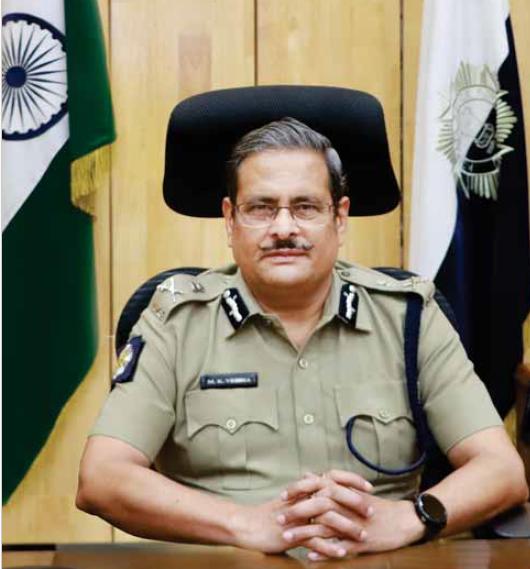
Foreword
Cybercrime encompasses a wide range of criminal activities utilising digital devices and networks to carry out illegal acts. As our reliance on technology, remote work, and automation increases, and billions of people become more dependent on digital solutions, online scams and fraud have escalated significantly. Users are exposed to a borderless digital world, making them more vulnerable to various forms of trickery.
Today, the Internet plays a vital role in nearly every aspect of life, from the operations of public and private enterprises to entertainment, education, and commerce. No one is immune to the effects of excessive internet use, whether they are employees in the private or public sector, freelance professionals, or farmers. Around the globe, data is becoming a crucial tool for ensuring public safety. With over 700 million internet users, India currently ranks as the second-largest internet user in the world, following China.
The COVID-19 pandemic in 2020 led to a surge in internet usage as many activities transitioned to digital platforms—from education and economic transactions to basic healthcare services. Working from home has become the new norm, increasing our dependence on the internet even further.
Extensive Internet usage introduces various vulnerabilities that cybercriminals exploit to gain unauthorised access to sensitive information and personal data. They steal this information to disrupt services and cause financial or reputational damage.
Unlike traditional crimes, cybercriminals can commit offences from a distance without being physically present, which makes cybercrime more dangerous for victims.
The rise of the Internet has made the spread of fake news and disharmony easier, prompting the Kolkata Police to establish a dedicated team to monitor these issues. Cybercrime has become a growing concern across all sectors, especially since the COVID-19 pandemic highlighted its reach, as seen with the surge of cyber criminals from the impoverished district of Nuh in Haryana in 2024. Every Internet user is a potential victim or offender, which makes cybercrime a major focus for law enforcement.
Kolkata Police has established Anti-Cyber Crime Cells in all ten divisions, and one Cyber Police Station at Lalbazar, to combat escalating cybercrime. This initiative allows residents to report cyber offences at their nearest Cell rather than travelling to the Headquarters. Committed to community safety, Kolkata Police encourages citizen input and promotes community policing.
With the increased use of the Internet, the police also monitor malicious activities to prevent the spread of fake news and maintain harmony in the community.
In 2024, Kolkata Police inducted a new batch of officers and constables. During their basic training at the Kolkata Police Training Academy, special emphasis was placed on the different types of cybercrimes occurring worldwide to prepare them for tackling these crimes when they enter active duty. Experienced police officers shared their firsthand experiences in dealing with various types of crimes, including cybercrime, emphasising the importance of experiential learning.
Regarding institutional security, systems are in place to alert users about potential vulnerabilities, enabling preventive action.
We have also been spreading awareness among the public about protecting themselves from cybercriminals. School students receive lessons on cyber etiquette and safety. We also encourage them to share this knowledge with their parents and grandparents, as children and the elderly are particularly vulnerable to cyber threats. Understanding cyber etiquette is crucial for self-protection against cyber criminals. Simple precautions, such as not sharing OTPs or email passwords with strangers, avoiding video calls from unknown numbers, and discouraging shoulder surfing in public places like ATMs and shops, can significantly reduce the risk of cyber attacks.
To prevent cyber attacks on institutions or systems, specific security measures are implemented to alert users of potential vulnerabilities, enabling them to take appropriate action to prevent such attacks.
Policing is one of the most challenging and demanding professions in the world. In the context of South Asia, particularly in the Indian subcontinent, challenges are continually increasing, exacerbated by population growth. This has led to a rise in Internet usage. With the broad accessibility of social media, community involvement has become essential for collaborative policing to resolve issues, de-escalate tensions, and build trust in policing as a social institution.
We sincerely appreciate the active participation of the community in documenting various forms of cyber offences. This exchange of information is instrumental in our efforts to address the continually evolving landscape of such offences and develop effective strategies for their prevention and eradication.
Manoj Kumar Verma, IPS
Commissioner of Police
Kolkata
Awareness is Key Don’t Be a Victim of Cybercrime
Dear Readers,
Digital vulnerability poses serious risks, as evidenced by a recent surge in scams involving fraudulent calls claiming to enact a ‘Digital Arrest’. These scams exploit the lack of public awareness, with criminals targeting diverse individuals and extorting money based on fabricated legal concepts.
Perpetrators often impersonate law enforcement officials, such as CBI agents or income tax officers, initiating contact through phone and video calls on platforms like WhatsApp or Skype. They use intimidating tactics, threatening victims with fictitious arrest warrants for alleged financial misconduct or tax evasion. In some cases, scammers have even set up mock police stations to lend credibility to their claims. Under the guise of helping victims ‘clear their name’, they coerce victims into transferring significant sums of money as a so-called ‘refundable security deposit’. Once the payment is made, the scammers disappear, leaving victims to grapple with financial loss and potential identity theft. Unlike many other forms of cybercrime, becoming a victim of a digital arrest scam is avoidable. Cybercriminals continuously devise new methods to exploit unsuspecting individuals. Vigilance is crucial, and initiatives like mandatory caller alerts have shown effectiveness. Organisations such as the Kolkata Police actively issue advisories to educate the public. By remaining alert and promptly reporting suspicious activities, individuals can aid law enforcement in apprehending these criminals, who often operate from various regions or have international connections.
Senior citizens and those with limited tech knowledge are especially vulnerable to scams, highlighting the need for digital literacy. Caution is crucial when answering unknown international calls or sharing personal data online. The digital arrest scam showcases Kolkata Police’s success in tracing culprits and recovering funds when reported quickly. Cybercriminals, aided by AI and professionalisation, create highly convincing schemes, making it harder to distinguish legitimate from fraudulent communications.
To empower individuals against these threats, awareness campaigns, community outreach, and digital literacy workshops are essential. These initiatives can help equip people with the skills necessary to recognise and address potential cyber risks effectively.
Kolkata Police have shown remarkable vigilance in addressing the evolving challenges of cybercrime. With a proficient and tech-savvy team, they are dedicated to effectively tackle these issues. Their work highlights the crucial role of collaboration between law enforcement and the community in the fight against cybercrime.
Ultimately, awareness remains the most powerful tool in preventing cybercrime. By staying informed, cautious, and proactive, citizens can safeguard themselves and contribute to a more secure digital environment.
Best Wishes,
Satya Swaroop
Managing Editor
satya@newmediacomm.biz
Brazil: Where Heaven Meets Earth
With its breathtaking waterfalls, vibrant culture, unique cuisine, some of the world’s most stunning beaches, and thrilling adventures, Brazil offers a variety of tourism experiences tailored to every preference. Prepare to be amazed by the wonders of this captivating country, as promised by Ivor Vaz.
Brazil, often regarded as one of the most underrated travel destinations globally, is a treasure trove of experiences waiting to be uncovered. While it is already a popular destination for tourists, with tourism playing a pivotal role in its economy, the country’s true essence remains underexplored. Iconic destinations such as Rio de Janeiro, Santa Catarina, São Paulo, Minas Gerais, Iguazu Falls, and the Pantanal offer unforgettable experiences for every traveller.
In 2023, Brazil welcomed 5,908,341 foreign visitors, a 62.7% increase from 2022 and just shy of the 6.3 million recorded in 2019 before the pandemic. These figures, reported by Embratur, the Ministry of Tourism, also exceeded the World Tourism Organization’s projections for Brazil by 3%.
Diverse Landscapes
Brazil boasts an astonishing variety of landscapes, from the lush Amazon Rainforest and pristine beaches of Rio de Janeiro to the vast Pantanal wetlands and the awe-inspiring Iguazu Falls. This diversity offers travellers a range of experiences, making it a paradise for nature lovers and adventurers alike.
Cultural Riches
Brazil’s cultural fabric is a vibrant mosaic woven from indigenous heritage, Portuguese colonial influences, and contributions from African, European, and Asian immigrants. This unique blend is reflected in its music, dance, art, and cuisine. Events like Rio de Janeiro’s Carnival, samba rhythms, and regional festivals celebrate the country’s rich cultural heritage.
Warm Hospitality
Renowned for their warm and welcoming nature, Brazilians create an inviting atmosphere that enhances the travel experience. Visitors often find themselves embraced by the genuine warmth of the locals, creating an inviting atmosphere that enhances the overall travel experience. The sense of community and the willingness to share their traditions make Brazil a welcoming destination.
Epicurean Delights
Brazilian cuisine is a delightful fusion of flavours and traditions. From the famous churrasco (barbecue) to feijoada (a hearty black bean stew), the culinary landscape caters to every palate. Food enthusiasts can explore bustling markets and street stalls to savour the authentic flavours of Brazil’s gastronomic wonders.

Adventure Opportunities
Brazil offers endless opportunities for thrill-seekers. Whether trekking through the Amazon, surfing in Florianópolis, or exploring the dramatic landscapes of Chapada Diamantina, adventure awaits at every turn for those seeking an adrenaline rush.

Affordability
Surprisingly budget-friendly, Brazil provides excellent value for travellers. Accommodations, meals, and activities are often more affordable than other global destinations, allowing visitors to maximise their experiences without overspending.

Off-the-Beaten-Path Gems
For those willing to venture beyond the iconic attractions, Brazil reveals hidden gems beyond the well-known attractions. Remote beaches, charming colonial towns, and untouched natural wonders await discovery.
Brazil’s status as an underrated travel destination underscores the vastness of its offerings, waiting to be explored by those seeking unique and enriching experiences. As you plan your next adventure, consider Brazil—a destination poised to exceed your expectations and leave you with memories to last a lifetime.

Eight Places You Must Visit in Brazil
There is an abundance to see and do in Brazil. Here are eight must-visit destinations in this Latin American paradise:
Rio de Janeiro
With over 450 years of history, Rio de Janeiro is a unique city that beautifully combines its geographic features—such as the sea, mountains, and forests—with vibrant human presence. To truly experience the energy of Brazilian culture, nothing compares to enjoying Carnival in Rio. Among the city’s most famous attractions are Sugarloaf Mountain, Christ the Redeemer, and Tijuca National Park. The Sugarloaf Cable Car, which operates at an altitude of 396 meters above sea level, connects Urca Mountain to Sugarloaf Mountain. Christ the Redeemer, with its open arms over Guanabara Bay, stands majestically on top of Corcovado Mountain, making it the largest and most renowned Art Deco sculpture in the world.

Commonly known as Sampa, São Paulo is a city that never sleeps. From theatrical performances and cultural exhibits to 24-hour bars and restaurants, visitors can always find something to do. The city shares its name with the state and boasts countless movie theatres, cultural centres, museums, historic buildings, parks, theatres, and art galleries. São Paulo’s nightlife is frenetic, creative, and inclusive, earning it a place among CNN’s list of the ten best places in the world for parties and nightlife. Additionally, the city is regarded as the Latin American capital of fine cuisine, featuring high-end international restaurants and sophisticated regional dishes crafted by renowned Brazilian chefs.
Belém

Belém, the capital of Pará, is a charming destination known for its beaches, forests, and historic heritage as well as modern tourist attractions. One of Belém’s main local highlights is a cultural complex called Estação das Docas (Wharf Station), which offers a variety of local cuisine, culture, fashion, and handicrafts. Visitors can enjoy performances of the carimbó, a traditional dance with Indigenous and African roots. As Belém is situated in the Amazon region, adventure seekers can explore trails in the forest or take boat rides to discover other beautiful beaches and islands in the region, such as Marajó, an island renowned for its natural beauty.
Manaus

Nestled in the heart of the Amazon Forest, Manaus is a city that boasts stunning architecture from the Rubber Boom era. The Amazonas Theatre, with its colourful dome adorned with 36,000 enamelled ceramic tiles, is a standout attraction. As the capital of Amazonas, Manaus serves as the main metropolitan hub of the region and is the natural gateway for exploring the Amazon Forest. Boats are the primary means of transportation to rainforest hotels and to witness the confluence of the Rio Negro and Solimões Rivers. Visitors can also observe Amazon River dolphins in Anavilhanas and visit places such as Moon Beach. Experience local gastronomy while touring the vast rivers and narrow streams that connect to riverside communities.
Foz do Iguaçu

In addition to the incredible Iguaçu Falls, Foz do Iguaçu boasts several attractions that will surely captivate you. Located in the extreme west of the State of Paraná, it is one of the icons of Brazilian tourism, thanks to the 275 majestic waterfalls that make up Iguaçu Falls. Situated in Iguaçu National Park, on the border between Brazil and Argentina, these Falls attract millions of visitors from around the world. Having earned a spot on the UNESCO World Natural Heritage List, the park’s stunning waterfalls were also voted one of the ‘World’s New Seven Wonders of Nature.’ Lonely Planet describes it as one of the top ten must-see places in the world, stating, “It’s an emotionally jaw-dropping experience. Everyone should see it at least once in their lifetime!”
Brasília

Brasília, Brazil’s third capital city, was planned just over 60 years ago, and its beauty lies in its intricate details, designs, and colours. Following Salvador and Rio de Janeiro, this audacious project has become a symbol of urban planning and modern architecture in the 20th century. Home to more than three million people, Brasília’s design, known as the Pilot Plan (Plano Piloto), was conceived by urban planner Lúcio Costa and architect Oscar Niemeyer. The layout resembles the shape of an aeroplane and has been included on UNESCO’s World Cultural Heritage List. Notably, Brasília is the city with the largest area on the Heritage List in the world. Its architecture stands apart from anything you have ever seen.
Fortaleza

Fortaleza, the capital city of Ceará in northeastern Brazil, has something for everyone. In addition to its countless stunning beaches, the city boasts a rich culture, delicious local cuisine, wonderful handicrafts, and beautiful architecture. Fortaleza offers various leisure options, including museums, theatres, handicraft markets, and a vibrant nightlife. Iracema Beach is a lively area where culture thrives, featuring movie theatres, a planetarium, and the Museum of Contemporary Art at the Dragão do Mar Centre of Culture and Arts. It becomes a bustling hub in the evenings with numerous bars, nightclubs, and live music. Visit the Central Market to take home an authentic souvenir from the city.
Salvador

The capital of the State of Bahia, Salvador, is renowned for its natural beauty and the strong influence of African culture. The Historic Centre of Salvador is where visitors can explore streets and architectural monuments dating back to Colonial Brazil, the Empire, and the First Republic. This culturally rich area includes the neighbourhoods of Sé, Pilar, and Pelourinho, which house historical monuments from the 17th, 18th, and 19th centuries. It is a popular destination for tourists seeking museums, theatres, churches, musical performances, local cuisine, and handicrafts. Salvador is home to more than 300 churches, including the São Francisco Church and Convent, classified as one of the Seven Wonders of Portuguese Origin in the World, and listed on the National Institute of Historic and Artistic Heritage List.